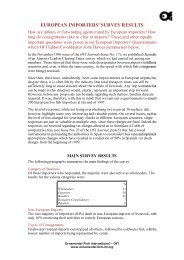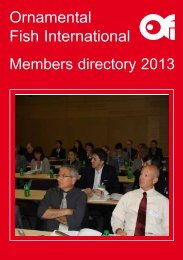Import and Export legislation - Ornamental Fish International
Import and Export legislation - Ornamental Fish International
Import and Export legislation - Ornamental Fish International
Create successful ePaper yourself
Turn your PDF publications into a flip-book with our unique Google optimized e-Paper software.
<strong>Ornamental</strong> <strong>Fish</strong> <strong>International</strong><br />
accordance with the provisions of the<br />
Convention <strong>and</strong>, in the case of a live<br />
animal or plant, if an import permit has<br />
been issued.<br />
In the case of a live animal or plant, it<br />
must be prepared <strong>and</strong> shipped to<br />
minimise any risk of injury, damage to<br />
health or cruel treatment.<br />
Appendix-II specimens<br />
An export permit or re-export<br />
certificate issued by the Management<br />
Authority of the State of export or reexport<br />
is required. An export permit<br />
may be issued only if the specimen<br />
was legally obtained <strong>and</strong> if the export<br />
will not be detrimental to the survival of<br />
the species.<br />
A re-export certificate may be issued<br />
only if the specimen was imported in<br />
accordance with the Convention. In the<br />
case of a live animal or plant, it must<br />
be prepared <strong>and</strong> shipped to minimise<br />
any risk of injury, damage to health or<br />
cruel treatment. No import permit is<br />
needed unless required by national<br />
law.<br />
Appendix-III specimens<br />
In the case of trade from a State that<br />
included the species in Appendix III,<br />
an export permit issued by the<br />
Management Authority of that State is<br />
required. This may be issued only if<br />
the specimen was legally obtained<br />
<strong>and</strong>, in the case of a live animal or<br />
plant, if it will be prepared <strong>and</strong> shipped<br />
to minimise any risk of injury, damage<br />
to health or cruel treatment.<br />
In the case of export from any other<br />
76<br />
Legislation<br />
State, a certificate of origin issued by<br />
its Management Authority is required.<br />
In the case of re-export, a re-export<br />
certificate issued by the State of reexport<br />
is required<br />
In its Article VII, the Convention allows<br />
or requires Parties to make certain<br />
exceptions to the general principles<br />
described above, notably in the<br />
following cases:<br />
o for specimens in transit or being<br />
transhipped;<br />
o for specimens that were acquired<br />
before CITES provisions applied to<br />
them (known as pre-Convention<br />
specimens);<br />
o for specimens that are personal or<br />
household effects;<br />
o for animals that were 'bred in<br />
captivity';<br />
o for plants that were 'artificially<br />
propagated';<br />
During the 13th CoP in Bangkok OFI<br />
organised a fieldtrip for delegates.<br />
Photo: Svein Fosså








